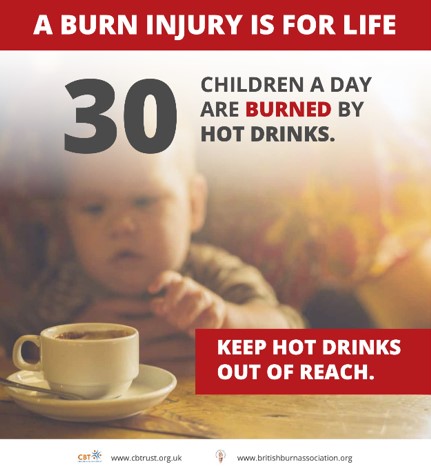
Firefighters are trying to educate residents across Tyne and Wear on how to treat burns – after 80 people were injured across the region in just six months.
Tyne and Wear Fire and Rescue Service (TWFRS) revealed six people suffered “severe” burns in their area in incidents they have attended since April.
Hundreds more would have also attended hospitals across the region after suffering burns as a result of small fires, hot radiators or having spilled a hot drink.
The Service say children and the elderly are most at risk when it comes to preventable and accidental burns around the household.
And today (Wednesday), on National Burns Awareness Day, their Head of Prevention and Education, called for more awareness when it comes to safety at home.
Group Manager Steve Thomas said: “There are many simple things we can do to ensure we are safe when it comes to preventable burns.
“Hot drinks are the most common cause of scald injury in children and the elderly are most often burnt by contact with central heating radiators or baths that are too hot.
“As we come into the winter months we often seen more cases of preventable burns, which is why small changes to the way we do things can go a long way.
“Small things can make a difference, including putting cold water in your bath first, be mindful of hot radiators and set hot drinks further back on your kitchen benches or coffee tables.”
Sharon Donnelly is a Practice Development Nurse in paediatric burns and plastic surgery at Newcastle Hospitals and said the best way to treat a burn is “to prevent it from happening in the first place.”
She said: “Many of the burn injuries we see each year at the RVI occur as a result of accidents in and around the home. Each year we see many scalds in the under 5 pre-school age child with the most typical being cascade scalds, where a child has managed to pull a hot substance onto themselves.
“Children are curious and like to explore and they don’t know that hot water and drinks can cause burns. Children also present with contact burns from hair straighteners, electric hobs and radiators as their mobility increases.
“A severe scald or burn has the potential to cause a serious injury which could lead to a long stay in hospital with us. Paediatric burn injuries affect the whole family and while not all burns are life threatening they all involve a scared child and require specific care that is personalised to that child and their family.
“The best way to treat a burn injury is to prevent it from happening in the first place.”
TWFRS are using National Burns Awareness Day as an opportunity to remind the public how to treat a burn – Cool, Call, Cover.
• Cool for 20 minutes under cold water
• Call for help
• Cover with cling film
And as bonfire night approaches, Group Manager Thomas issued a reminder for people to be responsible when it comes to fireworks.
He said: “With some organised displays cancelled again this year, we expect to see a rise in people setting fireworks off in private residence.
“But you need to be safe and keep your distance when it comes to fireworks, you must not throw them and don’t go near them if they haven’t gone off.
“A burn injury can change your life, not only physically but the mental toll it can have on you and your family is significant.”
For more information on National Burns Awareness day, visit the British Burns Association website.


